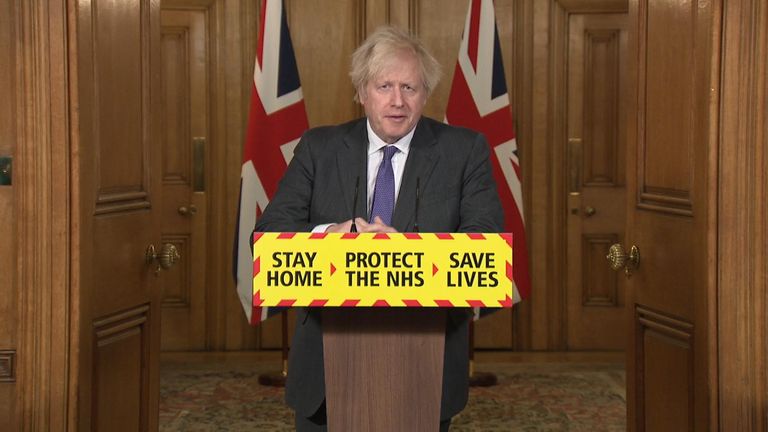Senior doctors have called on England's chief medical officer to halve the gap between the first and second doses of the Pfizer coronavirus vaccine.
The British Medical Association (BMA) says the gap between doses being given to patients should be cut from 12 weeks to six.
The World Health Organisation has recommended that the gap should be a maximum of 6 weeks - but the UK's Medicines and Healthcare Products Regulatory Agency (MHRA) has opted to delay a second Pfizer dose for up to 12 weeks, to ensure more people get the first jab sooner.
Pfizer initially tested the vaccine's efficacy when the two doses were given up to 21 days apart.
The chair of the BMA Council, Chaand Nagpaul, told Sky News the organisation would like "to have a dialogue with the chief medical officer over this issue" considering the differing advice.
Live COVID news from UK and around the world
He said a delay of six weeks - in line with the WHO's advice - would still allow for a high number of people to be vaccinated and would be more in line with other countries.
He said: "We wrote to the chief medical officer asking him to reconsider the decision in the UK, looking at guidance from the World Health Organisation, and and taking stock of the fact that no other nation in the world other than the UK has adopted the 12-week delay.
"A six-week delay compared to the original three weeks [advised by Pfizer] is still doubling the number of people who can be vaccinated."
Dr Nagpaul added: "We are talking specifically about the Pfizer vaccine, the AstraZenica vaccine has got approval from its manufacturer for a delay of up to 12 weeks."
Richard Vautrey, the chair of the BMA's GP committee, told Sky News the organisation is talking to Professor Chris Whitty, England's chief medical officer, but they want all the data for the UK's vaccination programme to be considered.
He said: "We are still not doing what the World Health Organisation and other European countries are doing but we need to understand the data… to really fully understand what level of protection is given after one dose."
More than 5.3m people have received their first vaccine jab across the UK.
Until they have had the second jab they won't have the maximum level of protection that it can provide.
Mr Vautrey said the BMA is "supportive" of the way the vaccination programme is targeting as many people as possible, but they are "open" to looking at the data and implementing it as "best we can".
A Department of Health and Social Care spokesperson said: "The decision by the MHRA to change vaccine dosage intervals followed a thorough review of the data and was in line with the recommendations of the UK's four Chief Medical Officers.
"Both vaccines provide a high degree of protection after the first dose, and the Government has closely followed the guidance of the Joint Committee on Vaccination and Immunisation (JCVI) which was clear that we should give as many people as possible some level of immunity initially."
Speaking at a Downing Street press conference on Friday, Professor Whitty said delaying a second jab would double the number of people receiving a vaccination.
He said extending the gap was a "public health decision" that would allow "many more people to be vaccinated much more quickly".
It follows data from Israel's vaccine rollout that suggested the efficacy of one Pfizer dose is just 33%.
Meanwhile, Prime Minister Boris Johnson has urged people to stay home and follow the rules after he revealed the new COVID variant, which emerged in the southeast of England, may cause "a higher degree of mortality".
He and a number of experts have also warned that lifting restrictions too soon would simply lead to another lockdown, leaving the UK with no hope of a return to normality any time soon.
The shift in tone comes as a series of hard-hitting government adverts launched on Friday evening, asking Britons if they "can look coronavirus patients in the eye".
The first of the new adverts, aired on ITV and Channel 4, features COVID-19 patients and the staff looking after them at Basingstoke and North Hampshire Hospital.
It begins with a room full of doctors trying to save someone in intensive care before showing the faces of those very ill with the virus and the medics taking care of them.
They remain silent, staring at the viewer, before a voice asks: "Can you look them in the eyes and tell them you're doing all you can to stop the spread of COVID-19?"
The prime minister's chief scientific officer Sir Patrick Vallance said that with the new variant, 13 or 14 people out of every 1,000 over the age of 60 with the virus are dying.
With the initial virus, the number was 10 in 1,000.
https://news.google.com/__i/rss/rd/articles/CBMiZGh0dHBzOi8vbmV3cy5za3kuY29tL3N0b3J5L2NvdmlkLTE5LWhhbHZlLXRoZS1nYXAtYmV0d2Vlbi12YWNjaW5lLWRvc2VzLXNlbmlvci1kb2N0b3JzLXVyZ2UtMTIxOTYwNjjSAWhodHRwczovL25ld3Muc2t5LmNvbS9zdG9yeS9hbXAvY292aWQtMTktaGFsdmUtdGhlLWdhcC1iZXR3ZWVuLXZhY2NpbmUtZG9zZXMtc2VuaW9yLWRvY3RvcnMtdXJnZS0xMjE5NjA2OA?oc=5
2021-01-23 12:06:12Z
52781321128098



Tidak ada komentar:
Posting Komentar